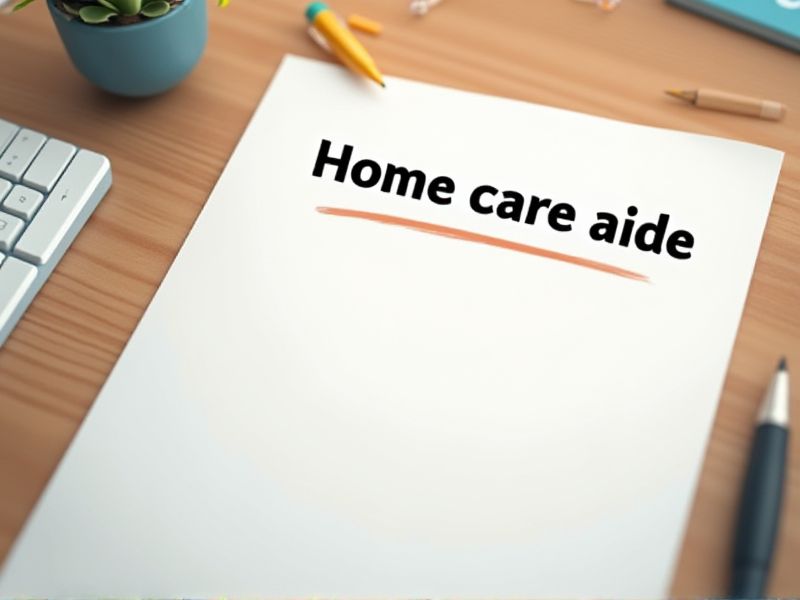
Home care aides play a crucial role in providing essential support to individuals who require assistance with daily living activities, often working with vulnerable populations. Obtaining relevant certifications ensures they possess the necessary skills and knowledge to deliver high-quality care and adhere to legal and safety standards. Certifications can enhance a home care aide's credibility and career prospects by demonstrating their commitment to professional development. These are key certifications you may require as a home care aide.
Certified Home Health Aide (CHHA)
The demand for Certified Home Health Aides (CHHAs) arises from the growing aging population, which often requires specialized care at home. CHHAs provide essential healthcare support, enabling patients to receive treatments and assistance with daily tasks without needing hospitalization. Their training includes vital skills such as monitoring vital signs and managing medications, thus enhancing patient safety. Families often face constraints in providing consistent care, and CHHAs fill this gap with their expertise and availability.
Certified Nursing Assistant (CNA)
Certified Nursing Assistants (CNAs) are essential for home care aide roles because they possess specialized training to handle medical and personal care tasks. Their expertise ensures that patients receive high-quality and personalized care in a home setting, addressing both medical and daily living needs. Having a CNA can significantly reduce the risk of hospital readmissions by monitoring and managing health conditions effectively at home. CNAs also offer emotional support and companionship, which can enhance patient well-being and improve overall quality of life.
CPR and First Aid Certification
Having CPR and First Aid certification enables home care aides to effectively respond to emergencies, increasing patient safety. This training equips aides with the skills to stabilize individuals, reducing the likelihood of complications before professional medical help arrives. Certification fosters confidence and proficiency, enhancing the overall quality of care provided to patients. Knowledge in these areas is crucial as it minimizes risks and enhances patient trust in home care services.
Basic Life Support (BLS) Certification
Home care aides often encounter emergency situations, and BLS certification equips them with the essential skills to manage cardiac or respiratory emergencies safely. With BLS training, aides learn how to perform CPR, which significantly increases a patient's survival chances in a cardiac arrest scenario. Certification ensures that aides can provide immediate and effective care until professional medical personnel arrive. Clients and their families gain confidence knowing the caregiver is prepared for critical situations.
Medication Administration Certification
Home care aides often manage clients with various medical conditions, necessitating a precise understanding of medication administration to avoid errors. Certification ensures that aides possess the necessary knowledge to handle medications safely and effectively, minimizing the risk of harmful side effects or interactions. Regulatory standards often require such certification to maintain quality and safety in home care settings, ensuring compliance with healthcare guidelines. Proper certification equips aides with confidence and competence, enhancing the overall care and trust between clients and caregivers.
Infection Control Certification
Infection Control Certification ensures that home care aides are equipped with the necessary skills and knowledge to prevent the spread of infections among vulnerable clients. When aides are certified, it reduces the risk of healthcare-associated infections, protecting both the client and the caregiver. Proper infection control practices can result in a decrease in hospital readmissions due to preventable infections. Certification enhances the credibility and professionalism of home care aides, which can lead to increased trust from clients and their families.
HIPAA Compliance Training
HIPAA Compliance Training is essential for home care aides to ensure the protection of patients' sensitive health information, as failing to uphold confidentiality can lead to legal repercussions. Proper training equips aides with the knowledge to recognize and mitigate security risks, reducing the potential for data breaches. Understanding HIPAA guidelines aids in maintaining patient trust and safeguarding an agency's reputation in the healthcare sector. Knowledge of HIPAA allows home care aides to communicate effectively and appropriately regarding patient information, preventing unauthorized disclosures.
Dementia Care Specialist Certification
Dementia Care Specialist Certification equips home care aides with targeted skills to address the unique challenges of dementia, enhancing care quality. Having specialized training enhances caregivers' ability to manage and de-escalate difficult behaviors often seen in dementia patients. Knowledge gained from the certification ensures that aides can create a safe, familiar, and comforting environment for individuals with dementia. Families seeking home care are more likely to trust and choose aides with certification, influencing employment opportunities positively.
Fall Prevention and Patient Safety Certification
Increased certification in fall prevention and patient safety enhances the skills of home care aides, resulting in reduced fall incidents in the home environment. Data shows that falls are a leading cause of injury among the elderly, making this certification crucial for improving patient outcomes. With specialized training, aides are equipped to identify and mitigate potential hazards, promoting safer living conditions for their clients. This certification fosters trust with patients and families, demonstrating a commitment to high-quality, safety-focused care.
Palliative Care Certification
Palliative Care Certification equips home care aides with specialized skills to manage pain and alleviate symptoms, enhancing patient quality of life. It fosters better communication with patients and families, aiding in emotional and psychological support during end-of-life care. Certification ensures adherence to best practices and enhances the credibility of care providers, leading to increased trust from patients and families. As the demand for home-based palliative care rises, certified aides are better positioned to meet the complex needs of an aging population.
Summary
By obtaining certifications, you enhance your credibility and marketability in the home care industry. This often leads to increased job opportunities and potentially higher wages. Employers tend to recognize certified aides as more skilled, resulting in greater trust and responsibility. Patients and families may also feel more secure, leading to more consistent and preferred assignments.
